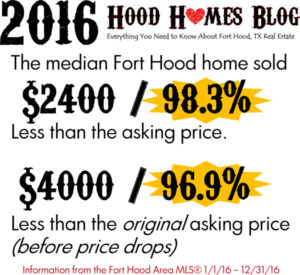 Takeaways
Takeaways
- If an offer is unacceptable, always counter it
- Don’t get offended when you get a low ball offer. There’s probably an innocent reason for it
- Be sure the offer is actually a low ball offer, and not the case that you are overpriced
What is a low ball offer?
 10% below your asking price is the most common definition I see for a “low ball” offer.
10% below your asking price is the most common definition I see for a “low ball” offer.
The 2016 Fort Hood housing market numbers confirms the 10% rule. The top 10% of biggest price drops versus the list price in 2016 began at $10,900 and higher (the 90th percentile). In other words, 10% of homes sold in 2016 sold at a price $10,900 or more under the asking price. As a percentage, 10% of homes sold at or under 91.2% of the list price.
In reality, a low ball offer is anything you, the seller, think is a low ball. If you got an offer, and the purchase amount offends you, keep reading!
By the way, the largest price drop in 2016 was $125,000.
Don’t Get Angry
In fact, expect low ball offers. Most buyers are trying to walk a fine line between getting as good a deal as possible and still being a serious buyer. Some walk that line better than others.
Be glad you have an offer (one you can use as leverage if any other buyers make offers), and begin the discovery process of whether this buyer is going to be a realistic option or not. There are a whole host of reasons why you might be getting one (see below for some possibilities). If you react negatively, you might turn off a buyer who is actually serious about your home.
Why are they low balling me?
There’s several reasons you might get an offer well under your asking price.
They aren’t serious
An absurdly low offer may indeed be a sign that the buyer (or their agent) simply doesn’t know what they’re doing. They may just be flinging numbers out thinking they’re getting a good deal.
They don’t care about what you care about
You think your pool is worth $10,000s. They think your pool will cost $10,000 – to fill in. Or perhaps you see a huge, spacious, verdant yard, and they see acres worth of mowing and sweat. Sometimes what has value to one homeowner is the opposite to another.
They are unfamiliar with the market
Presumably buyers have an agent who should be educating them on what to expect in your real estate market. But even then, maybe they need to see it to believe it.
Perhaps they come from another market where a home like yours is worth considerably less. They are just going from their past experiences.
They are testing you
There are some buyers are just fixated on getting the best deal. Not a surprise – everyone wants a deal. They don’t want even an outside chance of offering too high, so they go low.
These buyers especially are why it is always best to counter any offer. They just want to test your motivation level. Once they’re satisfied you’re not just going to hand them the keys and a deed, they might be ready to come to some terms that are satisfactory.
They are reaching and at their maximum budget
Home buyer’s eyes are usually bigger than their wallet. And often they may see your home even though it is more than they want (or even can) spend. To them, it’s worth just an outside shot that you might be able to come down to their budget. If not, they’ll likely move on, content to know they tried.
Their prequalification letter for a lender may show them at or close to their offer price. But it is common for buyers to get new letters specific for each offer, exactly at the offer price, even if they can afford more. Don’t let “this is all we can afford” cloud your judgement. In the cases that it is true, well, they probably aren’t the right buyer.
They are investors
Investor math is pretty tough on sellers, far more so than most sellers or real estate agents realize. There can be situations when selling to an investor makes a lot of sense (must sell fast and/or major repairs required). Read here for more about the pros and cons to selling to investors (biggest con – selling at a huge discount).
You are over priced
Maybe they’re not low balling you. Maybe you’re asking way too much and they’re the ones offering a fair price. Review your market analysis – do a new one if it’s been a few months – and make sure your expectations are based in reality.
What are my options?
Unfortunately, there is no way of telling what kind of buyer you have on your hands when you get a low ball. Therefore, the best thing to do is always counter.
A seller has four options when receiving an offer:
- Accept
- Counter
- Reject
- Ignore
Ignoring and rejecting are essentially the same thing, though it would be courteous to at least politely inform a buyer who took the time to write an offer – even if a lousy one – that you are declining.
If you get a low ball offer that you cannot accept, even after running a market analysis to confirm it is a low ball, you should still counter it, even if it is just to request the terms you are already asking for, e.g. you counter the original list price.
This lets the buyer know that you are still interested in selling to them if they improve their offer, without the finality of outright rejection.
Dropping the Price
Often sellers think that they should overprice their home deliberately a little, so that they can negotiate down with a buyer and still hit their bottom line.
I recommend against this, and in most cases encourage sellers to list as close to the actual market value as possible, and then stick closely to the price during negotiations.
But market analyses are not an exact science. Evaluate each offer on a case by case basis. Even a small concession on the price or some other contract terms might be enough for the buyer to think “I won!” and give them a good feeling about moving forward.
On the other hand, a buyer might feel insulted by too small a counter. If this is the case, and you’re confident in your market analysis, then again, it is probably not the right buyer for you anyway.
Get Creative
Your price is probably important to you and the buyer, but it may not be the most important item. Feel free to ask why the offer is so “low”, and see if there are other terms to the contract that would benefit your buyer. Perhaps they’d like a sooner closing date, or even an early move-in with a Buyer’s Temporary Lease. Maybe the offer is low because they are pricing in a certain repair that you would be happy to make yourself, and for far cheaper than the price drop they are asking about. Explore the “why” and you might find a win-win deal in there.
The Proper Way To Counter
Often when negotiating, sellers sometimes make changes to the original offer, initialing those changes and returning it to the buyer as a “counter”.
This is not wrong per se, but in most cases inadvisable – especially if countering a low ball offer. The reason is that the buyer can sign and execute the counter at any time – theoretically even months after your counter when you have long forgotten about them. By sending a draft they can execute, you are making a commitment to them that they can pull the trigger at any time.
The Texas Association of Realtors makes it very easy to counter an offer without making any commitments. The have the form called SELLER’S INVITATION TO BUYER TO SUBMIT NEW OFFER. This document makes it clear that you do not accept their original offer, but that you invite them to submit another offer which you will “more favorably consider” if they make changes. You are then given a space to list which changes you would like to see in the offer – a fair asking price, for example. They can then submit a new offer if inclined, which you can review then.
This also has the advantage of not precluding a multiple offer situation arising if there is recent interest.
Conclusion
Don’t get mad. Always counter. Get sold!
